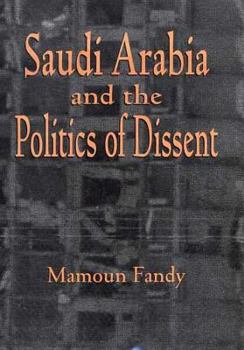Saudi Arabia and the Politics of Dissent
Select Format
Select Condition 
Book Overview
Few books on Saudi Arabia deal with primary sources in examining internal Saudi dissent. In contrast, Saudi Arabia and the Politics of Dissent relies on field work and the analysis of more than one... This description may be from another edition of this product.
Format:Hardcover
Language:English
ISBN:0312210213
ISBN13:9780312210212
Release Date:January 1999
Publisher:Palgrave MacMillan
Length:272 Pages
Weight:1.00 lbs.
Dimensions:1.0" x 5.8" x 8.6"
Customer Reviews
4 ratings
Great. Accurate. Insightful.
Published by Thriftbooks.com User , 21 years ago
This was an incredible book. I stumbled across it mistakenly when doing research on the rise of Islamic Fundamentalism for my Conflict in World Politics class last term.Fandy aptly disentangles and eradicates many of the commonly perpetuated myths of Islamic Fundamentalism and the entire "terrorist" movement, now. [For instance, it's said, time and time again -- both explictly and inadvertently -- that a major incentive to terrorists has been grounded in "failed" or "missed" prosperity, when in all reality, the majority of the 9/11 terrorists were from Saudi Arabia, a country inherently overflowing with opulence and prosperity because of its abundance in natural resources: oil.]The "terrorist" agents of 9/11 were well-educated, well-off young men with full lives ahead of them. The ring leaders of much of contemporary Islamic Fundamentalism are more often than not Western-educated, well-off, seasoned, wealthy men with doctorates. We're not dealing with a group of scorned poor people. The real driving force behind Islamic Fundamentalism has less to do with money and more to do with morale and issues of cultural validity, not to mention issues of perceived power, and so on...I can go on and on, but all in all, it was a really good book. Fandy does not -- or at least I don't believe so -- seek out to write a "Lies and the Lying Liars Who Tells Them" book. Not at all...it's much more scholarly, though when he lays down the bare facts...you begin to see how lots of popular political rhetoric is little more than rubbish for the under-educated masses.
Scholarly, watertight
Published by Thriftbooks.com User , 22 years ago
I read this book for a class on contemporary politics of the Middle East. Fandy's analysis of religious dissent in Saudi Arabia is in-depth and based on numerous primary sources. Instead of posing the regime as inexorably evil (or virtuous!), the author brings to bear some remarkable insights to explain how the House of Saud has attained a remarkable ascendancy over a region where familialism and kinship are ingrained into society.While the lay reader could get sidetracked by some esoteric political science terms (e.g. the author should have defined 'the political economy of signs'), overall the style of writing is clear and reasonably paced. My only major disappointment was the tight focus on RELIGIOUS opposition by figures such as Al-Auda and Bin Laden - royal dissent was not mentioned.In conclusion, I highly recommend this book to anyone interested in Saudi Arabia.
as heard on Fresh Air (NPR) 9/27/01
Published by Thriftbooks.com User , 23 years ago
The author of this book is one of the wisest voices around with an extremely broad and thoughtful perspective on the forces behind and surrounding the tragedy of September 11. While the book is not as related to the incident as his interview, his knowledge and feeling for how and why these groups act is second to none.
Cutting-edge scholarship
Published by Thriftbooks.com User , 25 years ago
Dr. Mamoun Fandy offers a new and challenging view of the contemporary scene in Saudi Arabia, where protest groups are using various modern means in their attempt to subvert the current Sa'ud regime. Fandy brings up new ideas that have not before been discussed, and offers a fresh examination of the phenomenon of protest movements in the Middle East. Such cutting-edge scholarship is a welcome departure from the dated and useless body of material offered up by the old-school dinosaurs of Middle Eastern political science (M. Hudson, etc.).






